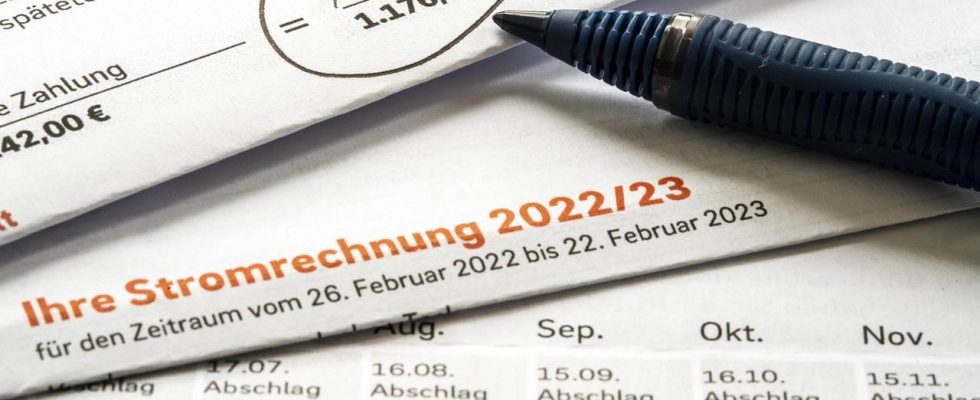background
More and more electricity and gas suppliers are passing on the falling wholesale market prices to their customers. Top dog E.ON also wants to lower prices. Tariff comparisons are worthwhile – if you pay attention to a few things.
Online comparison portals have done the math: By switching from the basic supply to a cheaper tariff, a household can save more than 500 euros in electricity costs, advertises Verivox. “That’s why consumers should take action now and change their provider,” writes Check24. Compared to basic services, families saved an average of 603 euros a year in addition to the gas price brake.
Amelie Vogler from the NRW consumer advice center advises caution with a view to the sums mentioned: “An average value says nothing about the possible savings of the individual.” Across from tagesschau.de the consumer advocate points out that the amount that can be saved by switching depends on the tariff you previously had.
What to think of “discounters”?
However, according to the consumer advice center in North Rhine-Westphalia, it is correct that changing gas and electricity suppliers can be worthwhile – precisely because the price increase last year was enormous. Many gas customers still have the higher prices in their tariffs. There are currently attractive offers for new customers in particular. But the consumer advocate advises taking a close look at the providers – reading reviews from other customers and looking for negative experiences.
Vogler advises against so-called “discounters”. Some of them had not acted in a consumer-friendly manner in the past – for example, during the high phase of energy prices, they stopped delivering overnight. In this situation, basic suppliers like E.ON had to take on electricity and gas customers who suddenly no longer had a supplier. At that time, the tariffs of the basic suppliers were sometimes the cheapest because the energy companies were able to cushion the price peaks with their longer-term contracts.
E.ON lowers prices with a time lag
The picture has recently turned again – which also has to do with long-term procurement. According to E.ON, the lower prices on the energy wholesale markets can only be passed on to customers with a time lag. The Essen-based energy giant recently announced that it would reduce the energy prices for several million customers as of September 1: by an average of 18 percent in the basic supply of electricity and 28 percent in the basic supply of gas.
However, this does not apply to all customers of what they say is the largest electricity and gas provider in Germany. In mid-April, E.ON announced a significant increase in electricity prices for the basic supply for customers in North Rhine-Westphalia and Bavaria, which will apply from June 1st. According to a company spokesman, the price reduction will only take effect for these customers with a delay of a few months.
Basic suppliers above the price brakes
An analysis by the online comparison portal Verivox shows that the average basic service prices are still above the price brake limits, while new customer tariffs are now set well below the price caps. The price cap for electricity is 40 cents per kilowatt hour and for gas 12 cents.
For months, Hans Weinreuter from the Rhineland-Palatinate consumer advice center has been aware that there are big differences even among the basic supply tariffs. When it comes to electricity, for example, the bandwidth is enormous: “The cheapest price is 26 cents per kilowatt hour, while another basic supplier charges over 60 cents per kilowatt hour.” This, in turn, is used by comparison portals when they advertise high savings potential when switching providers.
On the presets it matters
According to consumer advocates, the presettings of the portals are often based on the most expensive tariff. Across from tagesschau.de said Weinreuter, you have to pay attention to the default settings for the tariff calculator and ask yourself: “Is that the contract model I’m in right now?”
The consumer advocate also advises making sure that a new customer bonus is not included in the total price and that the contract period is not too long. Otherwise the savings potential looks greater than it actually is in the end with a change.
Helpful instruments – used correctly
The NRW consumer advice center recommends only considering tariffs with a bonus if you are considering changing providers again at the end of the first year of delivery. In addition, the direct change option should be issued via the portal. The same applies to the default “Only tariffs with high customer ratings” – this should also be better displayed.
From the point of view of consumer advocates, comparison platforms are helpful instruments if they are used correctly. The consumer advice center NRW has drawn up a checklist for changing providers. According to consumer advocate Amelie Vogler, after the chaotic past year, in which some suppliers even stopped delivering, it is now a matter of relieving people of the fear of looking around on the free market for the cheapest supplier.

